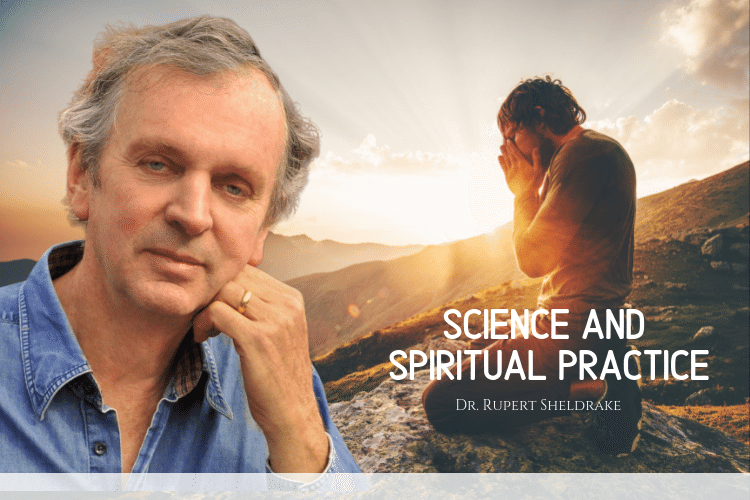Rupert Sheldrake – Science and Spiritual Practices

When I was doing research for my book, Ways to Go Beyond and Why They Work, I looked online to see what was happening in American states where cannabis is now legal among sorts of evangelical Christians. I was not totally surprised to find that in Colorado, for example, there are now cannabis-fueled Bible study groups, where people are meeting together to study the Bible are taking cannabis together, and people saying how much more effective this was, and how this was the kind of Jesus they were experiencing, they’d always wanted to know. And so on. Here in Britain, there is a sort of underground movement because cannabis is illegal here, called Cathedrals on Cannabis, where people take cannabis before visiting these great medieval cathedrals we have here in Britain and find that their holy experiences transformed. They have an extraordinary sense of divine presence which they might not have had so intensely without the cannabis. So, I’m sure that these drugs can play an important spiritual role, although it’s also clear that they’re dangerous and have to be done in an appropriate way by people who are old enough to know what they are doing.
Sandie Sedgbeer: Prayer, of course, is another one of your chapters. We all know there are enough studies been done on the power of prayer to know that there is something quite phenomenal happening when we engage in prayer.
Rupert Sheldrake: Yes, and there are studies that show that people who pray are much happier, healthier and live longer than those that don’t. In a study in America, they took about 2000 people age 65 and 1/2 of the group prayed regularly, the other half didn’t. They were matched for age, health level, income level, social status and all that. Six years later, the people who prayed had survived 65% better. The number that had died was 65% less than among those that didn’t pray. So actually, it has measurable effects on longevity and generally speaking, people who pray regularly, are much less prone to depression than those who don’t, so prayer certainly benefits the people who do the praying. It doesn’t always work in the sense that not all prayers for people’s healing work.
If they did and they would never die because most people who are in bad ways get prayed for and yet we die. But by the same token, the modern medical system isn’t 100% successful either for the same reason that if it was 100% successful, no one would ever die. And clearly, we do die. So my point really is that prayer can help people in all sorts of ways, including in healing. There are many examples of prayer leading to successful healing, not necessarily miraculous healings, but helping people get better with normal medical treatment. It’s not an either-or. It’s both. And so they can have many benefits.
Sandie Sedgbeer: Indeed. In 2017, I interviewed a leading commentator on religion, politics, and culture called Diana Butler Bass who wrote a book called Grounded: Finding God in the World, in which she argued that religion isn’t dying. There’s just a major transformation occurring in how people understand and experience God. In her research, more people were turning nature and the land, and a reviewer wrote something about that book that really stuck with me over the past few years. What they said was that it was an invitation to allow our experience to inform our theology rather than allow our theology to dictate our experience. And that review, that comment, was with me throughout the reading of your book. It certainly felt to me as though your book is an invitation to cultivate the seven spiritual practices which will allow our experiences to inform our theology.
Rupert Sheldrake: Absolutely. I’m so glad that it worked in that way for you, Sandy, because that really is one of my intentions. Spiritual practices lead to experience and it is the experience that is the key thing and, in fact, it is experience that underlies all religions. Originally, the Buddha didn’t get enlightened by doing a Ph.D.
Sandie Sedgbeer: Exactly. Dr. Rupert Sheldrake, thank you so much.
Rupert Sheldrake’s Science and Spiritual Practices and the soon to be published, Ways to Go Beyond and Why They Work are published by Counterpoint Press.
Connect with Dr. Rupert Sheldrake
You can connect with Dr. Rupert Sheldrake at his website www.sheldrake.org
A veteran broadcaster, author, and media consultant, Sandie Sedgbeer brings her incisive interviewing style to a brand new series of radio programs, What Is Going OM on OMTimes Radio, showcasing the world’s leading thinkers, scientists, authors, educators and parenting experts whose ideas are at the cutting edge. A professional journalist who cut her teeth in the ultra-competitive world of British newspapers and magazines, Sandie has interviewed a wide range of personalities from authors, scientists, celebrities, spiritual teachers, and politicians.





